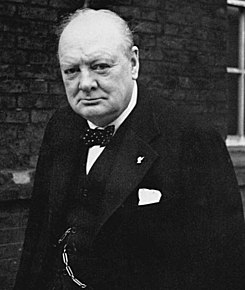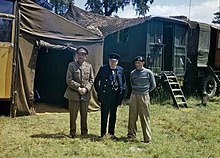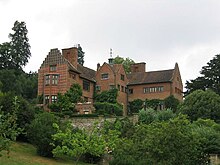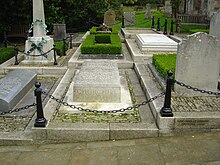 Sir Winston Leonard Spencer-Churchill, KG, OM, CH, TD, DL, FRS, RA (30 November 1874 – 24 January 1965) was a British politician who was the Prime Minister of the United Kingdom
from 1940 to 1945 and again from 1951 to 1955. Widely regarded as one
of the greatest wartime leaders of the 20th century, Churchill was also
an officer in the British Army, a historian, a writer, and an artist. He is the only British Prime Minister to have won the Nobel Prize in Literature, and was the first person to be made an honorary citizen of the United States.
Sir Winston Leonard Spencer-Churchill, KG, OM, CH, TD, DL, FRS, RA (30 November 1874 – 24 January 1965) was a British politician who was the Prime Minister of the United Kingdom
from 1940 to 1945 and again from 1951 to 1955. Widely regarded as one
of the greatest wartime leaders of the 20th century, Churchill was also
an officer in the British Army, a historian, a writer, and an artist. He is the only British Prime Minister to have won the Nobel Prize in Literature, and was the first person to be made an honorary citizen of the United States.Churchill was born into the aristocratic family of the Dukes of Marlborough, a branch of the Spencer family. His father, Lord Randolph Churchill, was a charismatic politician who served as Chancellor of the Exchequer; his mother, Jennie Jerome, was an American socialite. As a young army officer, he saw action in British India, The Sudan, and the Second Boer War. He gained fame as a war correspondent and wrote books about his campaigns.
At the forefront of politics for fifty years, he held many political and cabinet positions. Before the First World War, he served as President of the Board of Trade, Home Secretary, and First Lord of the Admiralty as part of the Asquith Liberal government. During the war, he continued as First Lord of the Admiralty until the disastrous Gallipoli Campaign caused his departure from government. He then briefly resumed active army service on the Western Front as commander of the 6th Battalion of the Royal Scots Fusiliers. He returned to government as Minister of Munitions, Secretary of State for War, and Secretary of State for Air. After the War, Churchill served as Chancellor of the Exchequer in the Conservative (Baldwin) government of 1924–29, controversially returning the pound sterling in 1925 to the gold standard at its pre-war parity, a move widely seen as creating deflationary pressure on the UK economy. Also controversial were his opposition to increased home rule for India and his resistance to the 1936 abdication of Edward VIII.
Out of office and politically "in the wilderness" during the 1930s, Churchill took the lead in warning about Nazi Germany and in campaigning for rearmament. On the outbreak of the Second World War, he was again appointed First Lord of the Admiralty. Following the resignation of Neville Chamberlain on 10 May 1940, Churchill became Prime Minister. His steadfast refusal to consider defeat, surrender, or a compromise peace helped inspire British resistance, especially during the difficult early days of the War when Britain stood alone among European countries in its active opposition to Adolf Hitler. Churchill was particularly noted for his speeches and radio broadcasts, which helped inspire the British people. He led Britain as Prime Minister until victory over Nazi Germany had been secured.
After the Conservative Party lost the 1945 election, he became Leader of the Opposition to the Labour Government. After winning the 1951 election, he again became Prime Minister, before retiring in 1955. Upon his death, Elizabeth II granted him the honour of a state funeral, which saw one of the largest assemblies of world statesmen in history. Named the Greatest Briton of all time in a 2002 poll, Churchill is widely regarded as being among the most influential people in British history, consistently ranking well in opinion polls of Prime Ministers of the United Kingdom.
First World War and the Post-War Coalition
On 5 October 1914, Churchill went to Antwerp, which the Belgian government proposed to evacuate. The Royal Marine Brigade was there and at Churchill's urgings the 1st and 2nd Naval Brigades were also committed. Antwerp fell on 10 October with the loss of 2500 men. At the time he was attacked for squandering resources. It is more likely that his actions prolonged the resistance by a week (Belgium had proposed surrendering Antwerp on 3 October) and that this time saved Calais and Dunkirk.Churchill was involved with the development of the tank, which was financed from naval research funds. He then headed the Landships Committee which was responsible for creating the first tank corps and, although a decade later development of the battle tank would be seen as a tactical victory, at the time it was seen as misappropriation of funds. In 1915, he was one of the political and military engineers of the disastrous Gallipoli landings on the Dardanelles during the First World War. He took much of the blame for the fiasco, and when Prime Minister Asquith formed an all-party coalition government, the Conservatives demanded his demotion as the price for entry.
For several months Churchill served in the sinecure of Chancellor of the Duchy of Lancaster. However on 15 November 1915 he resigned from the government, feeling his energies were not being used. Although remaining a member of parliament, on 5 January 1916 he was given the temporary British Army rank of lieutenant colonel and served for several months on the Western Front, commanding the 6th Battalion of the Royal Scots Fusiliers.While in command he personally made 36 forays into no man's land, and his section of the front at Ploegsteert became one of the most active. In March 1916, Churchill returned to England after he had become restless in France and wished to speak again in the House of Commons. Future prime minister David Lloyd George acidly commented: "You will one day discover that the state of mind revealed in (your) letter is the reason why you do not win trust even where you command admiration. In every line of it, national interests are completely overshadowed by your personal concern." In July 1917, Churchill was appointed Minister of Munitions, and in January 1919, Secretary of State for War and Secretary of State for Air. He was the main architect of the Ten Year Rule, a principle that allowed the Treasury to dominate and control strategic, foreign and financial policies under the assumption that "there would be no great European war for the next five or ten years".
A major preoccupation of his tenure in the War Office was the Allied intervention in the Russian Civil War. Churchill was a staunch advocate of foreign intervention, declaring that Bolshevism must be "strangled in its cradle". He secured, from a divided and loosely organised Cabinet, intensification and prolongation of the British involvement beyond the wishes of any major group in Parliament or the nation—and in the face of the bitter hostility of Labour. In 1920, after the last British forces had been withdrawn, Churchill was instrumental in having arms sent to the Poles when they invaded Ukraine. He was also instrumental in having para-military forces (Black and Tans and Auxiliaries) intervene in the Anglo-Irish War. He became Secretary of State for the Colonies in 1921 and was a signatory of the Anglo-Irish Treaty of 1921, which established the Irish Free State. Churchill was involved in the lengthy negotiations of the treaty and, to protect British maritime interests, he engineered part of the Irish Free State agreement to include three Treaty Ports—Queenstown (Cobh), Berehaven and Lough Swilly—which could be used as Atlantic bases by the Royal Navy. In 1938, however, under the terms of the Chamberlain-De Valera Anglo-Irish Trade Agreement, the bases were returned to the Irish Free State.
In 1919, Churchill sanctioned the use of tear gas on Kurdish tribesmen in Iraq. Though the British did consider the use of non-lethal poison gas in putting down Kurdish rebellions, it was not used, as conventional bombing was considered effective.
In 1923, Churchill acted as a paid consultant for Burmah Oil (now BP plc) to lobby the British government to allow Burmah to have exclusive rights to Persian (Iranian) oil resources, which were successfully granted.
First term as prime minister
"Winston is back"
After the outbreak of the Second World War on 3 September 1939, the day Britain declared war on Germany, Churchill was appointed First Lord of the Admiralty and a member of the War Cabinet, as he had been during the first part of the First World War. When they were informed, the Board of the Admiralty sent a signal to the Fleet: "Winston is back". In this position, he proved to be one of the highest-profile ministers during the so-called "Phoney War", when the only noticeable action was at sea. Churchill advocated the pre-emptive occupation of the neutral Norwegian iron-ore port of Narvik and the iron mines in Kiruna, Sweden, early in the war. However, Chamberlain and the rest of the War Cabinet disagreed, and the operation was delayed until the successful German invasion of Norway."We shall never surrender"
On 10 May 1940, hours before the German invasion of France by a lightning advance through the Low Countries, it became clear that, following failure in Norway, the country had no confidence in Chamberlain's prosecution of the war and so Chamberlain resigned. The commonly accepted version of events states that Lord Halifax turned down the post of prime minister because he believed he could not govern effectively as a member of the House of Lords instead of the House of Commons. Although the prime minister does not traditionally advise the King on the former's successor, Chamberlain wanted someone who would command the support of all three major parties in the House of Commons. A meeting between Chamberlain, Halifax, Churchill and David Margesson, the government Chief Whip, led to the recommendation of Churchill, and, as constitutional monarch, George VI asked Churchill to be prime minister. Churchill's first act was to write to Chamberlain to thank him for his support.Everywhere I went in London people admired [Churchill's] energy, his courage, his singleness of purpose. People said they "didn't know what Britain would do without him." He was obviously respected. But no one felt he would be Prime Minister after the war. He was simply the right man in the right job at the right time. The time being the time of a desperate war with Britain's enemies.An element of British public and political sentiment favoured a negotiated peace with Germany, among them Halifax as Foreign Secretary, but Churchill refused to consider an armistice.Although at times personally pessimistic about Britain's chances for victory—Churchill told Hastings Ismay on 12 June 1940 that "[y]ou and I will be dead in three months' time"—his use of rhetoric hardened public opinion against a peaceful resolution and prepared the British for a long war. Coining the general term for the upcoming battle, Churchill stated in his "finest hour" speech to the House of Commons on 18 June, "I expect that the Battle of Britain is about to begin." By refusing an armistice with Germany, Churchill kept resistance alive in the British Empire and created the basis for the later Allied counter-attacks of 1942–45, with Britain serving as a platform for the supply of the Soviet Union and the liberation of Western Europe.
In response to previous criticisms that there had been no clear single minister in charge of the prosecution of the war Churchill created and took the additional position of Minister of Defence, making him the most powerful wartime prime minister in British history. He immediately put his friend and confidant, industrialist and newspaper baron Lord Beaverbrook, in charge of aircraft production. It was Beaverbrook's business acumen that allowed Britain to quickly gear up aircraft production and engineering, which eventually made the difference in the war.
The war energised Churchill, who was 65 years old when he became Prime Minister. An American journalist wrote in 1941: "The responsibilities which are his now must be greater than those carried by any other human being on earth. One would think such a weight would have a crushing effect upon him. Not at all. The last time I saw him, while the Battle of Britain was still raging, he looked twenty years younger than before the war began ... His uplifted spirit is transmitted to the people". Churchill's speeches were a great inspiration to the embattled British. His first speech as prime minister was the famous "I have nothing to offer but blood, toil, tears, and sweat". One historian has called its effect on Parliament as "electrifying"; the House of Commons that had ignored him during the 1930s "was now listening, and cheering". Churchill followed that closely with two other equally famous ones, given just before the Battle of Britain. One included the words:
... we shall fight in France, we shall fight on the seas and oceans, we shall fight with growing confidence and growing strength in the air, we shall defend our island, whatever the cost may be, we shall fight on the beaches, we shall fight on the landing grounds, we shall fight in the fields and in the streets, we shall fight in the hills; we shall never surrender.The other:
Let us therefore brace ourselves to our duties, and so bear ourselves, that if the British Empire and its Commonwealth last for a thousand years, men will still say, 'This was their finest hour'.At the height of the Battle of Britain, his bracing survey of the situation included the memorable line "Never in the field of human conflict was so much owed by so many to so few", which engendered the enduring nickname The Few for the RAF fighter pilots who won it. He first spoke these famous words upon his exit from No. 11 Group's underground bunker at RAF Uxbridge, now known as the Battle of Britain Bunker on 16 August 1940. One of his most memorable war speeches came on 10 November 1942 at the Lord Mayor's Luncheon at Mansion House in London, in response to the Allied victory at the Second Battle of El Alamein. Churchill stated:
This is not the end. It is not even the beginning of the end. But it is, perhaps, the end of the beginning.Without having much in the way of sustenance or good news to offer the British people, he took a risk in deliberately choosing to emphasise the dangers instead.
"Rhetorical power", wrote Churchill, "is neither wholly bestowed, nor wholly acquired, but cultivated." Not all were impressed by his oratory. Robert Menzies, prime minister of Australia and himself a gifted phrase-maker, said of Churchill during the Second World War: "His real tyrant is the glittering phrase so attractive to his mind that awkward facts have to give way." Another associate wrote: "He is... the slave of the words which his mind forms about ideas.... And he can convince himself of almost every truth if it is once allowed thus to start on its wild career through his rhetorical machinery."
Throughout his life Winston Churchill suffered from clinical depression which he called his "Black Dog". His personal physician Lord Moran (Charles Wilson, 1st Baron Moran) in his book states that during the war years Winston sought solace in his tumbler of whiskey and soda and his cigar. He was also a very emotional man and would break into tears during meetings when he heard of bad news. During some of his broadcast speeches it was noticeable that he was trying to hold back the tears. It was during a meeting at the White House, when Churchill was handed a signal that Tobruk had fallen, that he burst into tears. The US President stood up, approached Churchill and said to him "What can we do to help?"
Perhaps the person best placed to summarise Churchill's contradictory motivations and flawed character during the war was the man who arguably worked most closely with him throughout most of the conflict, the Chief of the Imperial General Staff (CIGS) from December 1941 on, Field Marshall Alan Brooke. His diary entry for 10 September 1944, is particularly revealing :
... And the wonderful thing is that 3/4 of the population of the world imagine that Churchill is one of the Strategists of History, a second Marlborough, and the other 1/4 have no idea what a public menace he is and has been throughout this war! It is far better that the world should never know, and never suspect the feet of clay of this otherwise superhuman being. Without him England was lost for a certainty, with him England has been on the verge of disaster time and again ... Never have I admired and despised a man simultaneously to the same extent. Never have such opposite extremes been combined in the same human being.
The Second World War ends
As Europe celebrated peace at the end of six years of war, Churchill was concerned with the possibility that the celebrations would soon be brutally interrupted. He concluded that the UK and the US must anticipate the Red Army ignoring previously agreed frontiers and agreements in Europe, and prepare to "impose upon Russia the will of the United States and the British Empire." According to the Operation Unthinkable plan ordered by Churchill and developed by the British Armed Forces, the Third World War could have started on 1 July 1945 with a sudden attack against the allied Soviet troops. The plan was rejected by the British Chiefs of Staff Committee as militarily unfeasible.
Second term as prime minister
Return to government and the decline of the British Empire
After the general election of 1951, Churchill again held the office of Minister of Defence between October 1951 and January 1952. He also became prime minister in October 1951, and his third government—after the wartime national government and the brief caretaker government of 1945—lasted until his resignation in April 1955. In domestic affairs, various reforms were introduced such as the Mines and Quarries Act of 1954 and the Housing Repairs and Rent Act of 1955. The former measure consolidated legislation dealing with the employment of young persons and women in mines and quarries, together with safety, health, and welfare. The latter measure extended previous housing Acts, and set out details in defining housing units as "unfit for human habitation." In addition, tax allowances were raised, construction of council housing was accelerated, and pensions and national assistance benefits were increased. Controversially, however, charges for prescription medicines were introduced.
Housing was an issue the Conservatives were widely recognised to have made their own, after the Churchill government of the early 1950s, with Harold Macmillan as Minister for Housing, gave housing construction far higher political priority than it had received under the Attlee administration (where housing had been attached to the portfolio of Health Minister Aneurin Bevan, whose attention was concentrated on his responsibilities for the National Health Service). Macmillan had accepted Churchill's challenge to meet the latter's ambitious public commitment to build 300,000 new homes a year, and achieved the target a year ahead of schedule.
Churchill's domestic priorities in his last government were overshadowed by a series of foreign policy crises, which were partly the result of the continued decline of British military and imperial prestige and power. Being a strong proponent of Britain as an international power, Churchill would often meet such moments with direct action. One example was his dispatch of British troops to Kenya to deal with the Mau Mau rebellion. Trying to retain what he could of the Empire, he once stated that, "I will not preside over a dismemberment."
Retirement and death
In the 1959 general election Churchill's majority fell by more than a thousand, since many young voters in his constituency did not support an 85-year-old who could only enter the House of Commons in a wheelchair. As his mental and physical faculties decayed, he began to lose the battle he had fought for so long against the "black dog" of depression.
There was speculation that Churchill may have had Alzheimer's disease in his last years, although others maintain that his reduced mental capacity was merely the result of a series of strokes. In 1963, US President John F. Kennedy, acting under authorisation granted by an Act of Congress, proclaimed him an Honorary Citizen of the United States, but he was unable to attend the White House ceremony.
Despite poor health, Churchill still tried to remain active in public life, and on St George's Day 1964, sent a message of congratulations to the surviving veterans of the 1918 Zeebrugge Raid who were attending a service of commemoration in Deal, Kent, where two casualties of the raid were buried in the Hamilton Road Cemetery. On 15 January 1965, Churchill suffered a severe stroke that left him gravely ill. He died at his London home nine days later, at age 90, on the morning of Sunday 24 January 1965, 70 years to the day after his father's death.
Funeral
Churchill's funeral was the largest state funeral in world history up to that point in time, with representatives from 112 nations; only China did not send an emissary. Only Ireland did not broadcast the service live on television in Europe, where 350 million people watched, including 25 million in Britain. By decree of the Queen, his body lay in state in Westminster Hall for three days and a state funeral service was held at St Paul's Cathedral on 30 January 1965. One of the largest assemblages of statesmen in the world was gathered for the service. Unusually, the Queen attended the funeral. As Churchill's lead-lined coffin passed up the River Thames from Tower Pier to Festival Pier on the MV Havengore, dockers lowered their crane jibs in a salute.The Royal Artillery fired the 19-gun salute due a head of government, and the RAF staged a fly-by of sixteen English Electric Lightning fighters. The coffin was then taken the short distance to Waterloo station where it was loaded onto a specially prepared and painted carriage as part of the funeral train for its rail journey to Hanborough, seven miles north-west of Oxford.
The funeral train of Pullman coaches carrying his family mourners was hauled by Battle of Britain class steam locomotive No. 34051 Winston Churchill. In the fields along the route, and at the stations through which the train passed, thousands stood in silence to pay their last respects. At Churchill's request, he was buried in the family plot at St Martin's Church, Bladon, near Woodstock, not far from his birthplace at Blenheim Palace. Churchill's funeral van—former Southern Railway van S2464S—is now part of a preservation project with the Swanage Railway, having been repatriated to the UK in 2007 from the US, to where it had been exported in 1965.
Later in 1965 a memorial to Churchill, cut by the engraver Reynolds Stone, was placed in Westminster Abbey.

This work is licensed under a Creative Commons Attribution-ShareAlike 3.0 Unported License.




 03:21
03:21
 Planet Worldwide
Planet Worldwide











 Posted in:
Posted in:
0 comments:
Post a Comment